"How do I create a product recommendation quiz?"
I get this question weekly. Product quizzes took off in the early 2020s and they're still climbing.
The reason is simple: they increase conversions, they capture customer data, and visitors actually enjoy taking them. People want guidance when they shop.
I updated this guide for 2026. This guide covers everything you need to know about creating a product recommendation quiz for your eCommerce business. Your eCommerce business shouldn't hit a ceiling because your product discovery sucks.
I know you want some numbers on this as well, so here they are:
- 45% of online shoppers say that product filters are often incorrectly applied to products.
- 84% of shoppers struggle with search filters when shopping online
- The return rate for e-commerce purchases is estimated to be 17.6%
Your current way of doing things doesn't help shoppers buy. It doesn't help you sell.
I'm Jelmer. Three friends and I co-founded bluebarry, an AI product quiz builder for DTC eCommerce brands with 50+ products. I spend around a decade in marketing, both in eCommerce and 7 years in B2B SaaS. Since launching bluebarry, I've built 50+ product quizzes. This article covers what I've learned about quiz design, implementation, examples, marketing strategies, and advertising.
Why build a product recommendation quiz?
Start with the problem you're solving. "Wanting a quiz" isn't a goal. You're building a business. You need to fix actual problems.
Common use cases I see:
- Too many products on the store, customers get lost
- Low conversion rates from choice paralysis
- Declining ROAS
- Need a bigger email list to improve LTV
- Want better personalization
These fall into two categories: metrics (email list growth, conversions, ROAS) and usability (better user experience).
Both drive the same outcome: more conversions from the same marketing spend by matching buyers with the right product.
What are your product quiz goals?
Connect your use case to specific outcomes.
If this is your first quiz, don't overthink it. Pick the metrics you want to improve.
You don't need to calculate exact rates before you launch. If you've never run a quiz, you don't know how users will respond. Write down your goals and optimize from there.
Example goals:
- Increase conversion rates or ROAS by X%
- Increase AOV by X%
- Increase LTV
What is a Product Recommendation Quiz?
A product recommendation quiz helps shoppers find what they're looking for by asking them questions about their needs and preferences. Think of it as having a helpful salesperson guide you through options, but online. The quiz uses your answers to suggest products that actually fit what you're after, which means people are more likely to buy something they'll actually use.
You'll encounter different terms like Product Quiz, Product Finder, or Guided selling tool, but they all boil down to the same principles. It's all about guiding buyers towards the right product for them.
These are all part of "guided selling" tactics that eCommerce businesses use to, well, "guide" buyers to a product that they can sell.
Personally, I'm not the biggest fan of that terminology itself. I prefer "guided buying". Because that should always be your focal point (base perspective) when thinking about these types of tools.
Step-by-step building your first product quiz
It actually isn't rocket science, and it shouldn't be. You have better things to do than endlessly build product quizzes. You need to endlessly use them – put them to practice – instead of draining your agenda with quiz building hours.
Some stepping stones for you to build a product quiz:
1. Create an account (somewhere)
I can't force you, but it would be an honour if you want to build your first product quiz funnel with bluebarry ;).
Try generating a product quiz for your eCom store.
2. Start designing your first quiz
The design is the most important part of your quiz. At the end of the day, that's what thousands of visitors will remember about your quiz.
Create questions that:
- Focus on customer needs rather than product features
- Use simple, clear language
- Include visual aids when helpful
- Follow a logical progression
Example question sequence for a skincare quiz:
- "What's your main skin concern?" (Problem identification)
- "How would you describe your skin type?" (Current situation)
- "What results are you hoping to see?" (Goals)
3. Build the product recommendations logic
The second thing your visitors will remember is if the recommendation actually made sense. This is where the magic happens – or where everything falls apart I guess.
In my view, there are two "worlds" of building recommendations in the quiz building jungle:
- Route-based
- Attribute-based
If you have a large catalog, you shouldn't even want to think about trying a route-based approach. This approach means that you have to connect a product recommendation to every single possible route within your quiz (like a decision-tree).
For a simple 4 questions with 4 answers quiz, you're already working with 265 potential outcomes ("routes").
The other approach (attribute-based) is way, way better. With every question you can filter products based on attributes.
Simple example:
Question: Which colours do you like?
Answer: Blue
Logic: Only products with attribute blue are allowed to stay for the remaining party.
Saves you hours of implementation time.
4. Integrate with your marketing tools
This step isn't necessary to launch your first product quiz, but it's important for the long-term.
Product Quiz Integrations you can think about:
- Product feed manager: Channable, DataFeedWatch, ChannelEngine
- ESP (Email marketing): Klaviyo, Reloadify, ActiveCampaign, Brevo
- Advertising & Analytics platforms: Meta, Google Ads, GA4
- Low code platforms: Zapier, Make.com, N8N
- Customer Data Platforms: Spotler, Deployteq, Bloomreach
5. Implement on your webshop
Using Shopify? WooCommerce? Magento? Lightspeed? Shopware? Prestashop? Name all of them, product quizzes should work with all of those beautiful eCommerce platforms.
Disclaimer: If you're thinking about switching to another CMS, your product quiz has to switch too. That's why in most cases I wouldn't recommend a standard plugin that only works with your WooCommerce store for example. Inevitably your data will be gone when you switch to another CMS.
At bluebarry, we are working hard at keeping our "Getting started with bluebarry" videos up to date for you to quickly learn from and setup your first product quizzes. Ignore them if you want, watch them if you need.
Product Recommendation Quiz Examples
Coolblue has a product finder that helps you pick the perfect television.
Nike has a custom ShoeFinder (fully branded), that helps you pick the perfect … shoe.
Asics is doing the same.
Don't ignore these eCommerce giants. They're using product finders and quizzes throughout their webshops. Again, to help their buyers, and after they've helped their buyers, they're helping themselves. Because they are the ones increasing their revenue, margins (fewer returns) and overall customer insights.
Nike's shoefinder
Nike is asking targeted questions about how someone is going to use their running shoe. They completely ignore technical aspects of the shoe, and make sure everything is about the utility.
- Custom built
- Standalone website
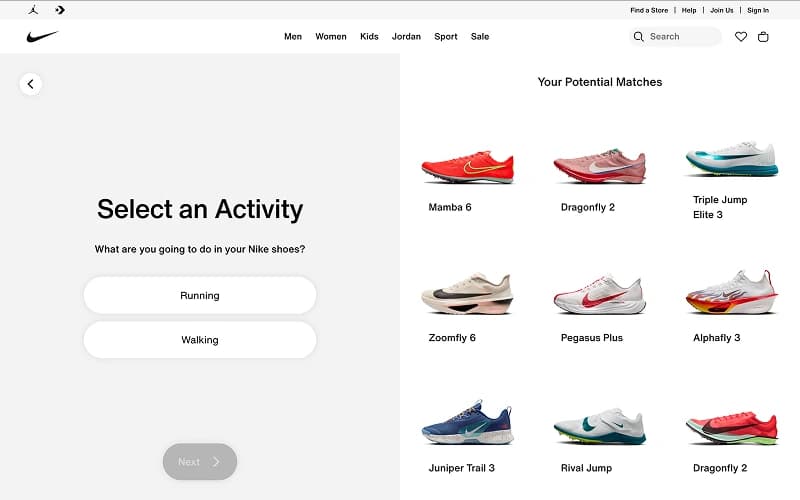
Fotocadeau's Gift finder
- Built with bluebarry
- 20% of quiz takers buy (abnormally high conversion rates – but doable)
- Printing industry
- Magento 2
- Gift finder
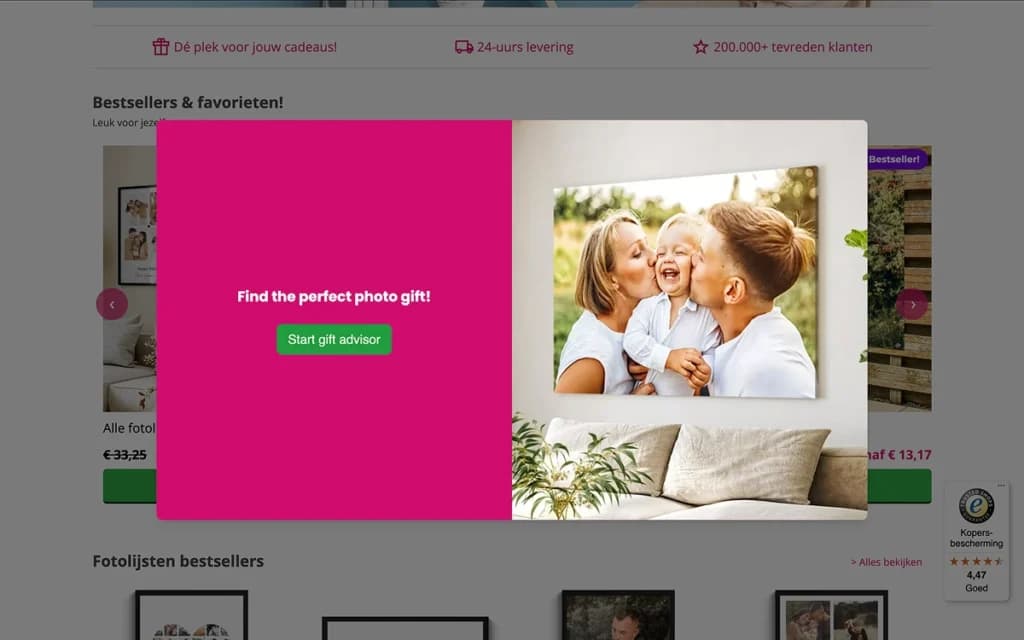
Kampeerhal Roden
- Built with bluebarry
- Outdoor & Camping industry
- Shopware 6
- 10+ categories with product finders and quizzes
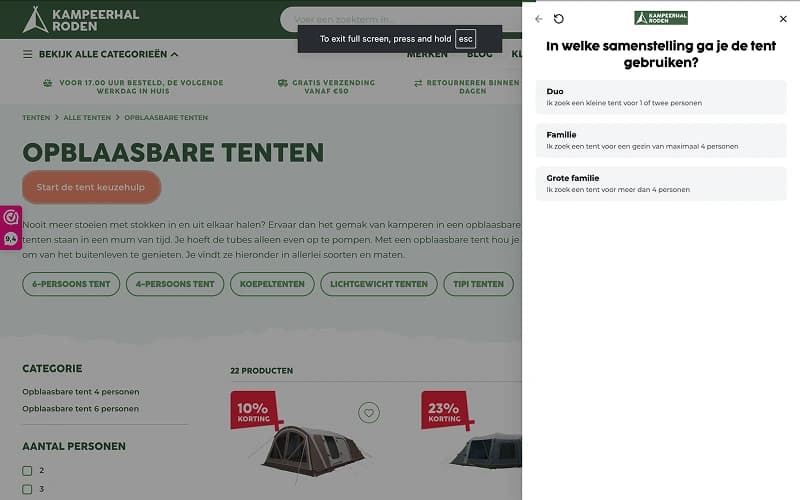
GoCups
- Built with bluebarry
- Selling to-go coffee cups
- Shopify
- Full personalization strategy with post quiz follow-up automations (connected with ESP, CDP, and more)
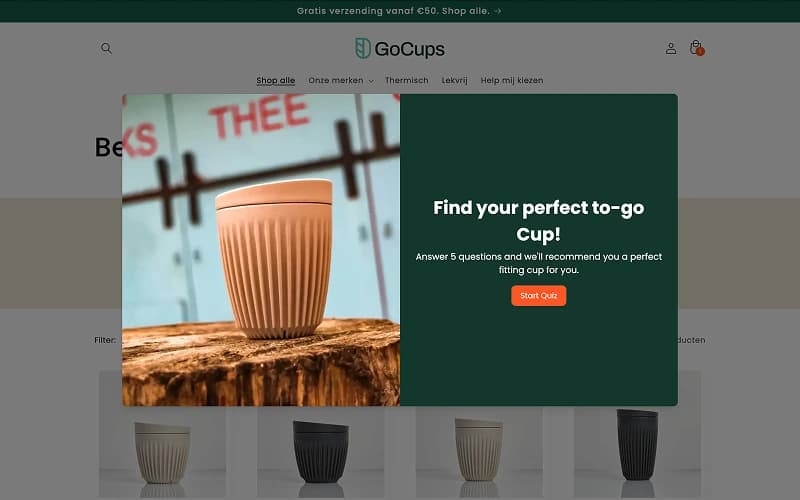
Common Product Quiz Mistakes to Avoid
Learn from these frequent pitfalls:
- Making quizzes too long (keep it under 7 questions)
- Too technical (using technical jargon)
- Not explaining why products were recommended
- Creating dead-end results
Product Quiz Software features you can't ignore
Mobile first design
Come on, this is 80-90% of your traffic. Your quiz builder should reflect that. And I don't mean it should just "work properly" on mobile and tablet devices (duuhh). I mean the design process of the quiz funnel has a mobile-first approach.
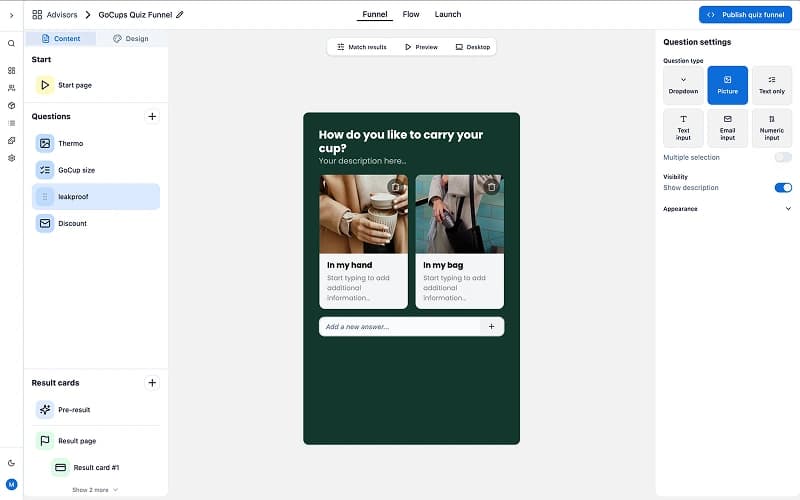
Flexible design options
We talked already a bit about the importance of design. I get it, this isn't important for everyone. But if you value your brand, value your identity as a business, having flexibility in design is so important for a good quiz building experience.
Dynamic recommendations
Static product bundles don't work. You need logic that considers multiple variables and delivers truly personalized results.
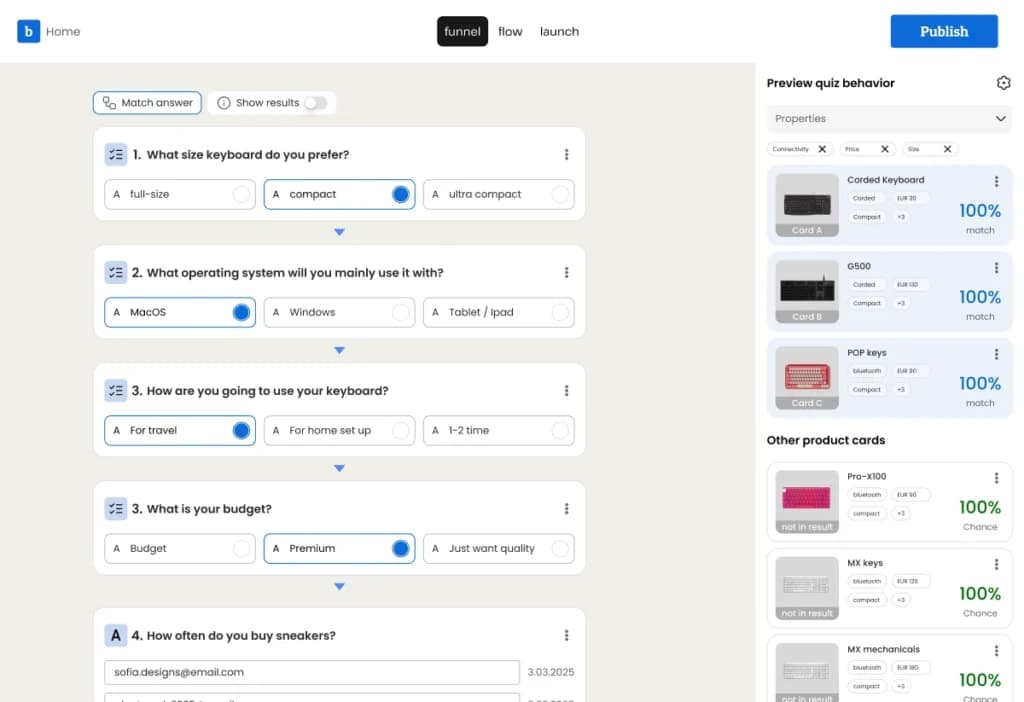
Integrations
Integrations are never mandatory, but in this case I would highly advise you to connect your product quiz tool with your ESP (Klaviyo, Reloadify, Mailchimp, etc).
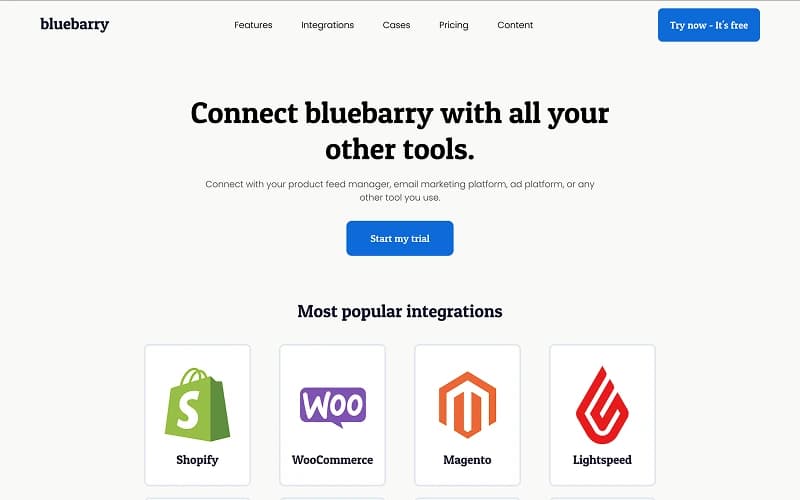
AI product quiz features
Simple. If you haven't implemented AI features as a product quiz solution for eCommerce, I'm not sure if I can take you seriously. Not as a gimmick, but features that take some load off during implementation of your quiz. Or AI features that help you with analyzing the insights, and coming up with improvements.
Measuring Quiz Success
Starting any investment needs upfront reasoning: Why are you investing in the first place in tools like this? How much bang do you want for your buck?
In my opinion, these are the metrics that you need to laser focus on to get the highest converting product quiz. (In no particular order.)
Track these key metrics to optimize your quiz:
- Completion rate
- Conversion rate from quiz takers
- Average order value from quiz purchases
- Email capture rate
- Customer satisfaction scores
Revenue Metrics
- Revenue (How many $$$ is your quiz generating?)
- Conversions (How many quiz takers make a purchase?)
- Conversion rates (What percentage of quiz takers make a purchase?)
User Experience Metrics
- Drop-off rates (What percentage of people drop off at certain questions?)
- Answer distribution rates (What percentage of people choose certain answers?)
Key components of a high-converting product quiz
You didn't click on this article to just get some basic explanation on some relative terms or vague concepts. You are here to learn how to build a product quiz that converts.
So that's what we'll do. When I look at the businesses that have high-converting product quizzes, I see patterns.
The components are a mix between how the user behaves, and how the product quiz tool behaves.
Here are 5 components of a high-converting product quiz.
1. Product recommendations that always make sense.
This is where so many go wrong: they just show a landing page with a product bundle or spit out random recommendations that feel like they came from a magic 8-ball.
The product recommendations that roll out your product quiz need to be dynamic and logical. Like a good bartender who remembers you like your whiskey neat, not on the rocks.
"Bad advice is worse than no advice at all."
Although I just made up that quote, I believe it's true. If you want to recommend a product to your audience, it should click immediately: "YES! That's the product I need indeed."
The recommendation should feel inevitable. Like of course that's the right product – how could it be anything else?
2. They never stop optimizing
Markets change, customers change, channels change, products change … by the time you think you've figured it all out, there's another obstacle in your way.
Sounds a bit like life, doesn't it?
A good product quiz builder shows you data. It shows you how quiz takers (your audience) have run through the quiz. What product recommendations they got. If they converted. If they dropped off at certain questions.
It's all there (or at least it should be, but we'll dive into the capabilities that a product quiz builder should have later in this article).
The best quiz owners treat their quiz like a living document. They tweak questions, adjust logic, and refine recommendations based on real user behavior.
3. Connected with ESP (email marketing)
Especially when selling higher-value products (slower decision rate) you can't expect your buyer to immediately make a purchase. We're talking about people here that are still a bit above the bottom of the funnel.
By connecting your ESP to your product quiz, you can capture email addresses and follow up with personalized recommendations. Think of it as planting seeds that you'll water over time until they bloom into sales.
Your quiz becomes the first touchpoint in a longer nurturing sequence. Someone who didn't buy today might buy next week when you send them that perfect follow-up email with their quiz results.
4. Design and Copy that stands out
Having a quiz in the first place is already setting you apart from competitors. You are doing something different. You show that you understand your customer and put them above anything else.
But you can take this one step further. By focusing on the quality of your copy writing within the quiz. This is just as important as beautiful design.
Simple example for your quiz starting page:
"Hey there, aren't you curious which product will be a perfect fit?"
This will increase quiz completion rates and quiz takers more than:
"Start your quiz now"
The first feels like a friend asking. The second feels like a command from a robot.
5. Smart product feed integration
Getting the right recommendation is one thing. Showing it in a way that makes people want to buy is another.
Your quiz results page isn't just a list of products. It's a mini sales page tailored to that specific person. Use language like: "Based on your choices, we recommend these products:" followed by compelling product descriptions that speak to their specific needs.
BONUS: Psychological tricks
I'm guessing you're in marketing. That means you're familiar with some level of human psychology or human behavior, which is also the basis of marketing I believe. Here – as a bonus – are some "tricks" you can put up your sleeve for higher conversion rates and completion rates:
Make the first step as small as possible
Humans have an aversion to 'unfinished business'. Exploit this by:
Adding a start page to your quiz that gets them committed before they see how long it is.
Making the first question as simple as possible. "What's your biggest challenge?" not "Please select all applicable demographic, psychographic, and behavioral characteristics that apply to your current situation."
This helps them quickly take the first steps, which reduces the likelihood that they'll abandon the quiz halfway through.
Endowment effect
Humans value stuff they own higher than the same stuff they don't own. It's why you feel attached to that car after the test drive.
Talk to your quiz takers as if the product that's being recommended is already theirs:
"YOUR perfect product" "YOUR ideal situation"
"Buy YOUR perfect fit right now"
That'll help them tap into a different state of mind, actually thinking that the product is theirs to begin with. Possession is nine-tenths of psychology.
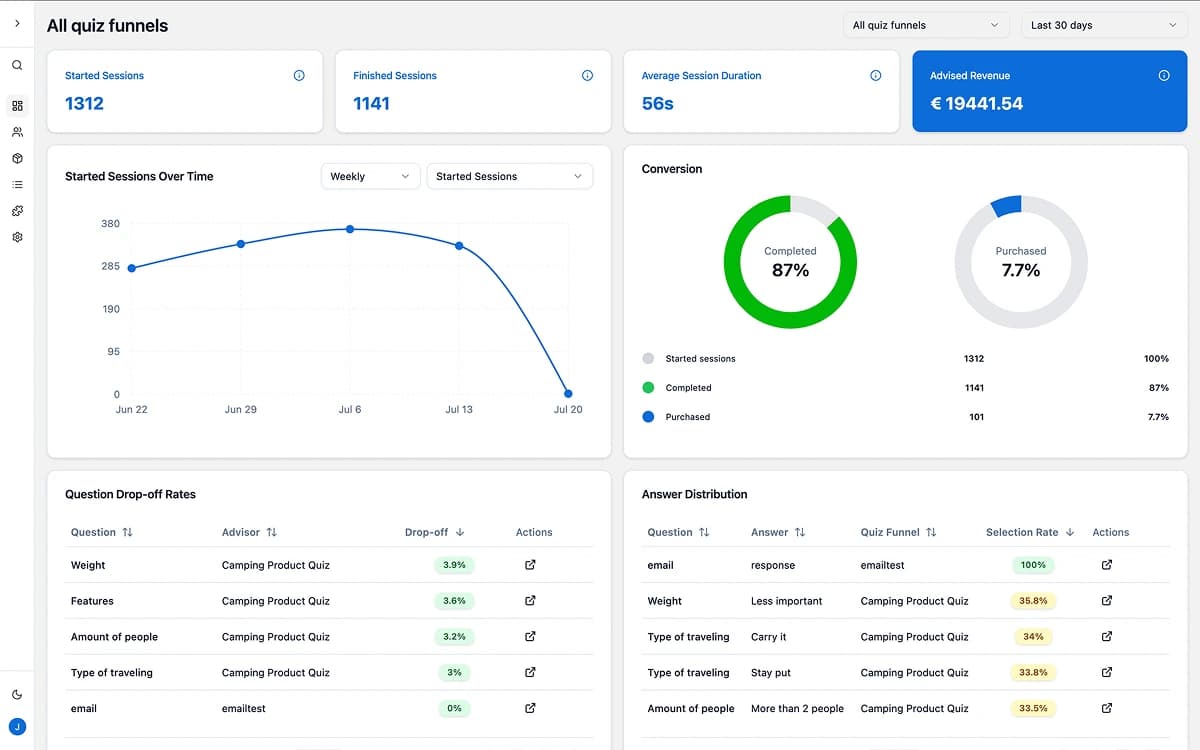
Why Choose bluebarry for Your Product Quiz
Sales pitch time!
Let me put on my marketing gloves and Cialdini hat for this one…
"Bluebarry emphasizes state-of-the-art quiz technology, enabling you to ensure conversio… bla bla bla."
Just joking.
It's simple. If you are a DTC brand in eCommerce with 50+ products (up to 100,000s of SKUs), we built the only quiz solution out there that'll help you achieve what you want: a high-converting and beautiful product quiz.
If you have just a couple of products, or design isn't really bothering you, there are some cheaper alternatives out there.
Ready to build a product recommendation quiz that converts? Just request a free trial and try it out with some real traffic first.
Start building your first Quiz Funnel (for free)
Start a no-commitment 14-day free trial and enjoy all bluebarry's features on your webshop. (No credit card needed.)